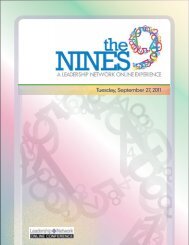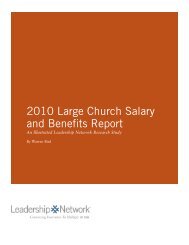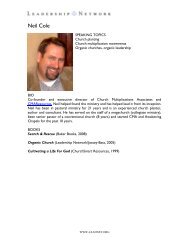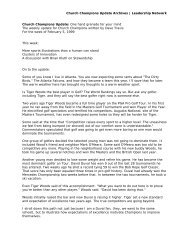ARE WE A PEOPLE AT HALF TIME? - Leadership Network
ARE WE A PEOPLE AT HALF TIME? - Leadership Network
ARE WE A PEOPLE AT HALF TIME? - Leadership Network
Create successful ePaper yourself
Turn your PDF publications into a flip-book with our unique Google optimized e-Paper software.
Readers of NEXT understand that we are<br />
living in a new world with new rules. In<br />
fact, many NEXT readers are helping to<br />
establish the new rules when it comes to<br />
21st century churches. Kevin Kelly,<br />
executive editor of Wired, has identified<br />
12 new rules for the new network economy.<br />
<strong>Leadership</strong> <strong>Network</strong> has been given<br />
permission to excerpt the article for<br />
NEXT, and we have chosen to highlight<br />
seven of the twelve rules. We thank<br />
Wired for the use of the material.<br />
The Digital revolution gets all the<br />
headlines these days. But turning<br />
slowly beneath the fast-forward turbulence,<br />
steadily driving the gyrating cycles of<br />
cool technogadgets and gotta-haves, is a<br />
much more profound revolution—the<br />
<strong>Network</strong> Economy.<br />
This emerging new economy represents a<br />
tectonic upheaval in our commonwealth, a<br />
social shift that reorders our lives more<br />
than mere hardware or software ever can.<br />
It has its own distinct opportunities and its<br />
own new rules. Those who play by the new<br />
rules will prosper; those who ignore them<br />
will not.<br />
The advent of the new economy was first<br />
noticed as far back as 1969, when Peter<br />
Drucker perceived the arrival of knowledge<br />
workers. The new economy is often<br />
referred to as the Information Economy,<br />
because of information’s superior role<br />
(rather than material resources or capital)<br />
in creating wealth.<br />
I prefer the term <strong>Network</strong> Economy,<br />
because information isn’t enough to<br />
explain the discontinuities we see. We have<br />
been awash in a steadily increasing tide of<br />
information for the past century. Many<br />
successful knowledge businesses have<br />
been built on information capital, but only<br />
recently has a total reconfiguration of<br />
information itself shifted the whole economy.<br />
The grand irony of our times is that the era<br />
of computers is over. All the major consequences<br />
of stand-alone computers have<br />
already taken place. In contrast, all the<br />
most promising technologies making their<br />
debut now are chiefly due to communications<br />
between computers—that is,<br />
to connections rather than to computations.<br />
And since communications is the basis of<br />
culture, fiddling at this level is indeed<br />
momentous.<br />
Information’s critical rearrangement is the<br />
widespread, relentless act of connecting<br />
everything to everything else. That is why<br />
the <strong>Network</strong> Economy is a big deal.<br />
The new rules governing this global<br />
restructuring revolve around several axes.<br />
First, wealth in this new regime flows<br />
directly from innovation, not optimization;<br />
that is, wealth is not gained by perfecting<br />
the known, but by imperfectly seizing the<br />
unknown. Second, the ideal environment<br />
for cultivating the unknown is to nurture<br />
the supreme agility and nimbleness of<br />
networks. Third, the domestication of the<br />
unknown inevitably means abandoning the<br />
highly successful known—undoing the<br />
perfected.<br />
The <strong>Network</strong> Economy is not the end of<br />
history. Given the rate of change, this<br />
economic arrangement may not endure<br />
more than a generation or two. Once<br />
networks have saturated every space in our<br />
lives, an entirely new set of rules will take<br />
hold. Take these principles, then, as rules<br />
of thumb for the interim.<br />
1. The Law of Connection<br />
Embrace dumb power<br />
The <strong>Network</strong> Economy is fed by the<br />
deep resonance of two stellar bangs: the<br />
collapsing microcosm of chips and the<br />
exploding telescom of connections. These<br />
sudden shifts are tearing the old laws of<br />
wealth apart and preparing territory for the<br />
economy.<br />
As the size of silicon chips shrink to the<br />
microscopic, their costs shrink to the<br />
microscopic as well. They become cheap<br />
and tiny enough to slip into every (and the<br />
key word here is ‘every’) object we make.<br />
Soon, all manufactured objects, from<br />
tennis shoes to hammers to lamp shades to<br />
cans of soup, will have embedded in them<br />
a tiny sliver of thought. Because they can<br />
be stamped out fast and cheap, like candy<br />
gumdrops, these chips are known in the<br />
industry as “jelly beans.”<br />
As we implant a billion specks of our<br />
thought into everything we make, we are<br />
6<br />
also connecting them up. Stationary<br />
objects are wired together. The nonstationary<br />
rest—that is, most manufactured<br />
objects—will be linked by infrared and<br />
radio, creating a wireless web vastly larger<br />
than the wired web.<br />
The glory of these connected crumbs is<br />
that they don’t need to be artificially<br />
intelligent. Instead, they work on the dumb<br />
power of a few bits linked together. Dumb<br />
power is what you get when you network<br />
dumb nodes into a smart web. It’s what our<br />
brains do with dumb neurons and what the<br />
Internet did with dumb personal computers.<br />
A PC is the conceptual equivalent of a<br />
single neuron housed in a plastic case.<br />
When linked by the telescom into a neural<br />
network, those dumb PC nodes created<br />
that fabulous intelligence called the World<br />
Wide Web. It works in other domains:<br />
dumb parts, properly connected, yield<br />
smart results.<br />
The net is not just humans typing at each<br />
other on AOL. Rather, the net is the<br />
collective interaction spun off by a trillion<br />
objects and living beings, linked together<br />
through air and glass.<br />
This is the net that begets the <strong>Network</strong><br />
Economy. According to MCI, the total<br />
volume of voice traffic on global phone<br />
systems will be superseded by the total<br />
volume of data traffic in three years.<br />
The whole shebang won’t happen<br />
tomorrow, but the trajectory is clear. We<br />
are connecting all to all. Every step we<br />
take that banks on cheap, rampant, and<br />
universal connection is a step in the right<br />
direction. Furthermore, the surest way to<br />
advance massive connectionism is to<br />
exploit decentralized forces—to link the<br />
distributed bottom. How do you make a<br />
better bridge Let the parts talk to each<br />
other. How do you improve lettuce<br />
farming Let the soil speak to the farmer’s<br />
tractors. How do you make aircraft safe<br />
Let airplanes communicate among<br />
themselves and pick their own flight paths.<br />
In the <strong>Network</strong> Economy, embrace dumb<br />
power.<br />
2. The Law of Plenitude<br />
More gives more







